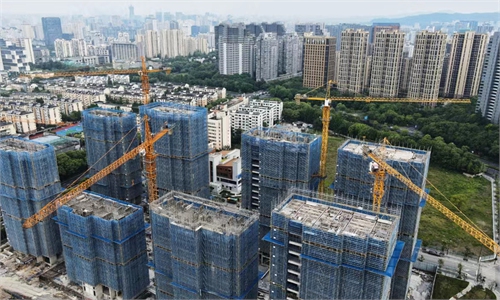China scraps mortgage rate floor, cut down payment ratios in ‘unprecedented’ policy package to bolster property market

Citizens visit a property developer's sales office in Ningbo, East China's Zhejiang Province, on March 4, 2023. Photo: VCG
China on Friday announced a multi-pronged approach concerning every aspect of the real estate market ranging from relaxing down payments and cutting housing loan interest rates to reducing housing inventory. Industry insiders said the sweeping measures mark an "unprecedented" move in the past few decades, which could promptly reverse a property adjustment downturn and fuel a full-fledged rebound across the housing sector.The policy combo was also announced after a Communist Party of China (CPC) Central Committee Political Bureau meeting on April 30, which demanded research on policies to reduce housing inventory and improve the quality of newly-added housing - among other listed economic work priorities. The transition to a new property development model also aligns with the spirit of the tone-setting Central Economic Work Conference, which called for "establishing the new before abolishing the old."
Observers said the much-anticipated boost measures, adding to an array of policy tools that have been put in place, showed that Chinese policymakers have formed a comprehensive assessment of the economic situation and are prescribing a problem-oriented approach in tackling headwinds. As social expectation for the economy being lifted up, it is expected that the country's GDP is on track to hit around 5 percent this year, or even reach 5.5 percent if policies yield greater effects, analysts noted.
The People's Bank of China, the country's central bank, and the National Financial Regulatory Administration announced that the minimum down payment ratios for individuals' commercial housing mortgages will be lowered to 15 percent for first-home purchases, down from the previous 20 percent, and 25 percent for second-home purchases.
"This is the lowest down payment ratio in history, the slackest policy in the history of mortgage lending, and the most lenient property policy in recent years," Yan Yuejin, research director at Shanghai-based E-house China R&D Institute, told the Global Times on Friday.
It also represents the most significant move in down payment policy relaxation for China's housing sector, he said, fully demonstrating that the country attaches great importance to property destocking and supports reasonable housing consumption demand, including for basic and upgraded housing.
With regard to mortgages, China's central bank said on Friday that it would lower the interest rate for housing provident fund loans by 0.25 percentage points for both first-time and second-time homebuyers from Saturday.
The housing provident fund is a long-term housing savings plan made up of compulsory monthly deposits by both employers and employees. It can only be used by employees for house-related expenses, according to the State Council, China's cabinet.
Meanwhile, authorities also announced on Friday the abolition of the floor level of the interest rate for individuals' commercial housing loans for first and second homes across the country.
Central bank branches can determine the lower limits of commercial mortgage rates in accordance with local conditions, and financial institutions should set the floor lending rates based on their business conditions and borrower risks, the central bank said.
"This is also an important embodiment of mortgage interest rate marketization. In the past, the lowest housing loan interest rate in some cities was 3.5 percent. But under the current policy, banks can decide the interest rate themselves, and even an interest rate below 3 percent is possible," Yan said.
On the demand side, "the joint effect of 'low down payment plus low housing loan interest rates' will constitute a new circle for homebuyers, revitalizing the market," Yan added.
Chinese Vice Premier He Lifeng said on Friday that local governments of regions where there are relatively large commercial housing stocks are allowed to buy some homes at reasonable prices and provide them as affordable housing, the Xinhua News Agency reported. He made the comments at a teleconference focused on ensuring the delivery of housing projects.
Before He's remarks, some localities in Hangzhou, East China's Zhejiang Province and Dali, Southwest China's Yunnan Province, have been trialing a pilot program under which authorities would be encouraged to purchase residential units in excessive supply for use as public rental housing or guaranteed housing.
Observers expect this set of ground-shaking tools to have a far-reaching impact on the property industry, which has been under strain since 2020. "The positive impact will reverberate across every sector, from elevating market transactions and boosting homebuyers' confidence to improving property developers' liquidity and driving equities of property-related industries," Yan stressed.
A Beijing-based housing agent surnamed Liu told the Global Times on Friday that he is waiting for detailed implementations from the local housing authority. Liu expected that there will be a palpable surge in housing transactions to follow, in particular drawing into groups with insufficient down payment but strong repayment capabilities.
Stocks related to real estate immediately rose after the announcement of the measures, with several rising to the daily limit. The Shanghai Property Index rose 3 percent.
Sufficient planning, research, discussion
Observers said that the series of policies unveiled on Friday are specifically targeted at the softness of the real estate market, and are being launched at a "proper time," with sufficient research, planning and policy deliberation.
"There is a clear roadmap: on the one hand, it is stimulating and expanding consumption from the demand side. On the other hand, in the supply side, while continually pushing the de-leveraging efforts, it is mitigating potential financial risks by channeling liquidity," Li Changan, a professor at the Academy of China Open Economy Studies of the University of International Business and Economics, told the Global Times on Friday.
All those measures are conducive to the long-term sound and sustainable development of the industry, he said.
The CPC Central Committee Political Bureau meeting in April stressed continuously preventing and defusing risks in key areas. It demanded research on policies to reduce housing inventory and improve the quality of newly-added housing, noting that efforts should be pushed ahead to establish a new model of the real estate sector to promote its high-quality development.
According to Li, China's efforts to build up a new development model also embodied the spirit of "establishing the new before abolishing the old," a highlight from the Central Economic Work Conference held in December, in other words, to regulate the industry and foster upbeat market expectations with innovative measures, and subsequently shake off an inappropriate and outdated debt-driven growth model.
The fresh property policies also add to a package of targeted stimulus measures that have already been carried out to mitigate downward pressure throughout the year. Chinese officials have called for more efforts to "frontload and effectively implement" established macro policies.
China issued 40 billion yuan ($5.63 billion) of ultra-long special treasury bonds with a term of 30 years on Friday, which marked the first batch of its 1 trillion yuan of such bonds that will be used to raise funds for implementing major national strategies and building up security capacity in key areas this year.
Tian Yun, a veteran economist based in Beijing, told the Global Times on Friday that if the headwinds are properly addressed, the country will be well positioned to reach its annual GDP target of around 5 percent, or could even expand at up to 5.5 percent depending on the effects of stimulus measures.
After getting off to a good start in the first quarter, China's economy maintained stable growth in April, with key indexes on industry, exports and employment showing improvement from March and new driving forces maintaining rapid growth, according to data released by the National Bureau of Statistics on Friday.
Recently, international financial institutions including Goldman Sachs, Morgan Stanley and UBS have upgraded their forecasts for China's economic growth this year. In a latest move, the European Commission recently upgraded its forecast for China's 2024 economic growth to 4.8 percent, up by 0.2 percentage points from its previous projection.


